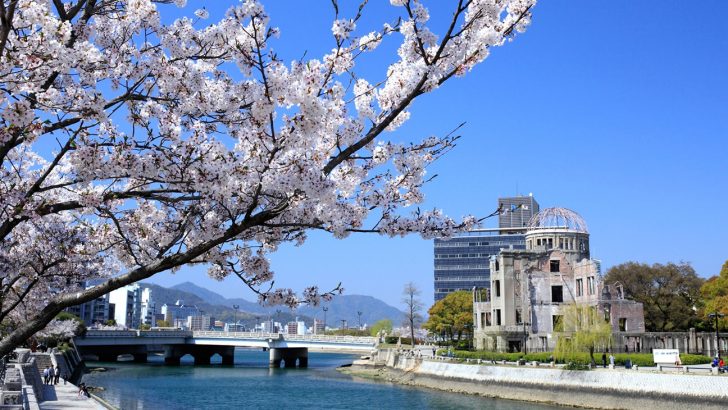Very few readers of The Irish Catholic will be watching season three of Twin Peaks, I suspect. It’s not on one of the main channels and it has only a cult following because its content is too surreal for most tastes. But in one recent episode we were taken back to the first test of an atomic bomb in the New Mexico desert. The director, David Lynch, took us deep into the hell of the mushroom cloud. Inside the cloud we see the face of the evil at work in Twin Peaks ever since the first season, as if it was born in the mushroom cloud on that fateful day.
Lynch seemed to be telling us that the explosion of the first atomic bomb unleashed something new and evil into the world. Only three weeks after the test, on August 6, 1945 to be precise, an atomic bomb was dropped on the Japanese city of Hiroshima and three days after that again, on the city of Nagasaki.
Nagasaki, as it happens, had the greatest concentration of Christians in Japan. It is located on the southernmost point of the main Japanese islands. It is a port city where, in centuries past, Western traders and missionaries often arrived.
St Francis Xavier planted a mission church there in 1549. Japan brutally suppressed Christianity from 1600 until the 1850s. The penalty for being a Christian was death. But when the American navy arrived there in the mid-1800s, using gunboat diplomacy to force Japan to trade with the outside world, thousands of Christians were found to have been practising their faith in secret in Nagasaki and elsewhere in defiance of the death penalty.
So, it is particularly ironic that the Americans choose this as one of the cities to drop an atomic bomb on. It exploded directly over Urakami cathedral, the biggest Christian building in East Asia. It is scarcely fathomable that these Christians, the descendants of those who had risked death for their faith, were killed at the hands of an ostensibly Christian nation.
Civilisation
The writer Desmond Fennell has written that Western civilisation as we had known it ended when the Americans dropped the atomic bombs on Japan.
The two bombs between them killed in the region of 150,000 people. The justification to this day for dropping the bombs (a justification I once accepted) is that the bombs brought the war to a speedy end and therefore saved enormous numbers of both Japanese and American lives.
The Americans were planning the invasion of Japan and dreaded it. The Japanese had fought with incredible and fanatical ferocity on the minor Japanese island of Okinawa. They essentially fought to the last man. Would they do the same again once the main islands were invaded? If so, the death toll might have climbed well past the million mark, plus tens, if not hundreds of thousands of American soldiers. Would US president, Harry Truman, be able to face the parents of those soldiers and tell them he had a weapon which could have ended the war early and saved their sons, but he didn’t use it?
There are two lines of argument against this justification, a pragmatic one and a principled one. The pragmatic one is that the Japanese were on the point of surrender anyway, and what brought them to the point of surrender was the Soviet invasion of Japanese-occupied Manchuria.
This happened on the same day the bomb was dropped on Nagasaki, but the Japanese knew the invasion was coming and knew then there was no hope of the sort of favourable surrender terms they wanted. This is something I have read about only recently, although this interpretation of Japanese intentions is disputed.
In addition, seven of America’s eight five-star officers in 1945 — Gens Dwight Eisenhower, Douglas MacArthur and Henry Arnold, and Adms William Leahy, Chester Nimitz, Ernest King and William Halsey — later said the dropping of the atomic bombs was militarily unnecessary, morally reprehensible, or both.
This didn’t stop President Harry Truman calling the dropping of the first bomb, “the greatest thing in history”.
But suppose, for the sake of the argument, that it was the dropping of the two bombs which rendered unnecessary the invasion of Japan, would it be justified then? The answer is still no, because some things are wrong in themselves regardless of the outcome. To put it another way, the end does not justify the means.
For example, most of us know that it would be wrong to carry out destructive experiments on innocent people even if the result was a cure for cancer which would save literally millions upon millions of lives. (Destructive experimentation on human embryos is justified today because those who rule us have decided these embryos are not human at all.)
Firebombing
Tens of thousands of totally innocent people died at Hiroshima and Nagasaki just as countless more had died in the firebombing of cities like Tokyo (using non-nuclear weapons) and in the bombing of German cities like Dresden.
The Catholic Church teaches that the direct and intentional killing of innocent human beings is always wrong. There is no way, therefore, that a Catholic can justify the direct targeting of civilian populations whether by nuclear or non-nuclear weapons.
We will leave the last word to no less a figure than Admiral William Leahy, President Truman’s White House Chief of Staff, who said: “The lethal possibilities of atomic warfare in the future are frightening. My own feeling was that in being the first to use it, we had adopted an ethical standard common to the barbarians of the Dark Ages.”


 David Quinn
David Quinn The A-bomb Dome and Hiroshima Peace Memorial Park.
The A-bomb Dome and Hiroshima Peace Memorial Park. 